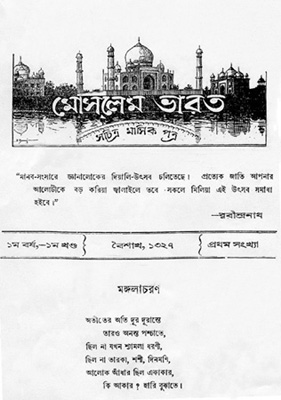Related Research Articles

Kazi Nazrul Islam was a Bangladeshi poet, short story writer, journalist, lyricist and musician. He is the national poet of Bangladesh. Nazrul produced a large body of poetry, music, messages, novels, and stories with themes, that included equality, justice, anti-imperialism, humanity, rebellion against oppression and religious devotion. Nazrul Islam's activism for political and social justice as well as writing a poem titled as "Bidrohī", meaning "the rebel" in Bengali, earned him the title of "Bidrohī Kôbi". His compositions form the avant-garde music genre of Nazrul Gīti.

The Bangla Academy is the official regulatory body of the Bengali language in Bangladesh. It is an autonomous institution funded by the Government of Bangladesh that fosters the Bengali language, literature and culture, works to develop and implement national language policy and conducts original research in Bengali. Established in 1955, it is located in the Burdwan House in Shahbagh, Dhaka, within the grounds of the University of Dhaka and Suhrawardy Udyan. The Bangla Academy hosts the annual Ekushey Book Fair.

Abu Bashar Mohammad Ishaque was a Bangladeshi novelist. He graduated B.A. from Karachi University. He was the Deputy Director of NSI.
Mohammad Yakub Ali Chowdhury was a Bengali essayist and journalist. He was noted as one of the few Bengali Muslim literary scholars of his time.
Qazi Imdadul Haq (1882–1926) was a Bengali writer.
Sheikh Abdur Rahim was a Bengali writer and journalist.

Bangiya Sahitya Parishat is a literary society in Maniktala of Kolkata, West Bengal, India. Established during the time of the British Raj, its goal is to promote Bengali literature, both by translating works in other languages to Bengali and promoting the production of original Bengali literature.

Muzaffar Ahmad was an Indian-Bengali politician, journalist and a co-founder of the Communist Party of India.
Nowsher Ali Khan Yusufzai was a Bengali writer and philanthropist.

Mohammad Mozammel Huq was a Bengali-language poet, novelist, magistrate and educationist. His writings were said to have been inspired by a "Muslim renaissance".

Bengali Muslims are adherents of Islam who ethnically, linguistically and genealogically identify as Bengalis. Comprising about two-thirds of the global Bengali population, they are the second-largest ethnic group among Muslims after Arabs. Bengali Muslims make up the majority of Bangladesh's citizens, and are the largest minority in the Indian states of West Bengal, Tripura and Assam.
Mujibur Rahman Khan was a Bangladeshi journalist, litterateur and politician.

The Freedom of Intellect Movement was a Bengal Renaissance movement advocating rationality against religious and social dogma in Bengali Muslim society. It was spearheaded by intellectuals in the University of Dhaka during the British Raj.The movement also established the prestigious Muslim Literary Society in Dhaka.
Khan Bahadur Abdul Aziz (1863–1926) was an educationist, writer and social worker from Bengal Presidency.
Mearajuddin Ahmad was a 19th-century Bengali academic, writer, and Islamic scholar.
Mohammad Rowshan Ali Chowdhury was a Bengali journalist, writer, poet and politician.

The Muslim Bharat was a historic literary journal that published from Kolkata in the early 20th century. It published works by notable Bengali authors and poets; such as Abanindranath Tagore, Kalidas Roy, Kaikobad, Qazi Imdadul Haq, Kazi Abdul Wadud, Kumud Ranjan Mullick, Mohitlal Majumdar, Mohammad Barkatullah, Satyendranath Dutta, Sheikh Fazlul Karim, and Syed Emdad Ali.
Langal was a Bengali leftist-literary magazine published from Kolkata in the early 20th century. It was edited by Kazi Nazrul Islam.
Mohammad Raushan Yazdani was a Bengali author and researcher of folk literature. As a folklorist, his work was crucial due to his discoveries of tales and poems from the remotest villages of eastern Bengal. His most celebrated work is Momenshahir Loka-Sahitya dedicated to folk literature in Momenshahi (Mymensingh) Yazdani was one of the most popular Bengali poets in the Pakistan period.
Mohammad Mozammel Haq was a Bengali politician, lawyer, poet, philanthropist and litterateur. He served as a chief whip of the Bengal Legislative Assembly.
References
- 1 2 Ahmed, Wakil. "Bangiya Mussalman Sahitya Samiti". Banglapedia. Archived from the original on 3 February 2019. Retrieved 28 June 2018.
- ↑ Ahmed, Wakil. "Bangiya Sahitya Bisayini Mussalman Samiti". Banglapedia. Archived from the original on 28 June 2018. Retrieved 28 June 2018.
- ↑ "Part XXXIV: Colonialism, politics of language and partition of Bengal". New Age. Archived from the original on 28 June 2018. Retrieved 28 June 2018.
- ↑ Haque, Khondkar Sirajul. "Bangiya Mussalman Sahitya Patrika". Banglapedia. Archived from the original on 28 June 2018. Retrieved 28 June 2018.
- ↑ "10 key events in Kazi Nazrul's life". The Daily Star. 27 August 2015. Archived from the original on 11 May 2020. Retrieved 28 June 2018.